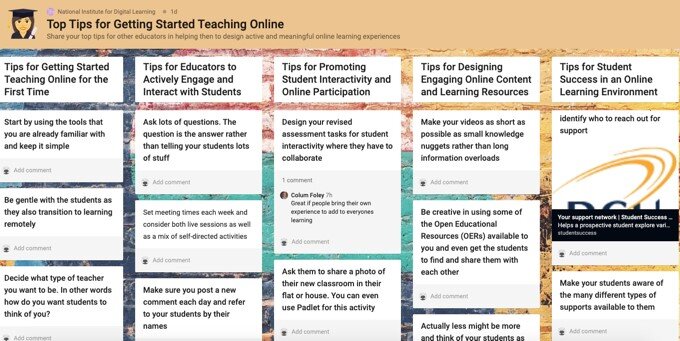https://blogs.edweek.org/edweek/campaign-k-12/2020/04/many-parents-coronavirus-impact-learning-shrug-off.html
Two important caveats: The ability to access the internet is crucial for the survey respondents. And the poll has a relatively significant margin of error.
The coronavirus pandemic has forced the vast majority of schools nationwide to close for several weeks; several states and U.S. territories have closed their schools’ doors for the rest of the 2019-20 academic year. At the same time, states and districts have rushed to get remote learning sessions up and running, with varying success.
++++++++++++
more on education and politics in this IMS blog
https://blog.stcloudstate.edu/ims?s=education+politics
++++++++++++++
more on history in this IMS blog
https://blog.stcloudstate.edu/ims?s=history
++++++++++
more on augmented reality in this IMS blog
https://blog.stcloudstate.edu/ims?s=augmented+reality
Responding to Covid-19: The Good, the Bad and the Ugly of Teaching Online
https://www.icde.org/icde-blog/2020/3/26/responding-to-covid-19
Importantly, today’s educators in the digital-era have a range of new teaching methods, activities and resources they can consider when choosing their learning designs. Although the traditional face-to-face lecture is not dead, delivering a monologue for an hour to a passive audience of learners is hardly the gold standard of good teaching in the 21st Century–irrespective of delivery mode. This point should not be overlooked in the rush to replace conventional teaching with live online sessions using platforms like Zoom.

Most importantly, what we want to avoid is using old 19th Century teaching methods on new 21st Century technologies to merely dump large volumes of undigested information down large digital diameter pipes to relatively inactive and passive learners.
ICDE has a series of forthcoming webinars you can join and you will find around a dozen different types of online course offerings available right now for educators on our NIDL Resource Bank.
+++++++++++++++
more on distance education in this IMS blog
https://blog.stcloudstate.edu/ims?s=distance+education
https://www.edutopia.org/article/formative-assessment-distance-learning
Whether we use synchronous or asynchronous online sessions, whether we call it distance or virtual learning, we’re all challenged to provide meaningful education experiences at a distance as the education world grapples with the impact of Covid-19.
Know your purpose
Collect data over time
Focus on feedback
Check for understanding in synchronous sessions
Leverage personal conversations
Check in on SEL
Make it useful
+++++++++++++++++++

+++++++++++++++++
formative assessment in this IMS blog
https://blog.stcloudstate.edu/ims?s=formative+assessment
https://blogs.umass.edu/onlinetools/
National Research Council’s (2000) four types of learning environments: assessment-centered, community-centered, knowledge-centered, and learner-centered.
++++++++++++++++
more on online education in this IMS blog
https://blog.stcloudstate.edu/ims?s=online+education
https://nepc.colorado.edu/blog/does-it-work
One of the most frequently and persistently asked questions about online education is “does it work” or “is it effective.”
The question is meaningless because there cannot be any definitive answer for a number of reasons.
First, online education (and its variants such a online instruction, online teaching, distance education and distance learning) is a big umbrella that covers a wide array of different practices, which vary a great deal in terms of quality. Comparing the effectiveness of online education with face-to-face education has been the most common research approach to examine the effectiveness of online education. And the answer has been, for a long time, that there is no significant difference between the two. This answer, however, does not mean online is effective or not, it simply means there are plenty of effective and ineffective programs in both online and face-to-face education. In other words, the within variation is larger than the between variation.
Second, another reason that there cannot be a definitive answer to this question is the diversity of stakeholders in online education.
And unfortunately what works for one stakeholder may not work for the others.
Third, even within the same program and with only students as the stakeholder, there cannot be a definitive answer because no program can possibly have the same effects on all students equally.
Fourth, yet another reason that the question cannot have a definitive answer is the multiplicity of outcomes. Education outcomes include more than what has been typically measured by grades or tests.
Fifth, the rapid changes in technology that can be used to deliver online education add to the elusiveness of a definitive answer to the question. While pedagogy, design, and human actors certainly paly a significant role in the experiences of online education, so does technology.
++++++++++
more on online education in this IMS blog
https://blog.stcloudstate.edu/ims?s=online+education
+++++++++
https://blog.zoom.us/wordpress/2020/03/20/keep-the-party-crashers-from-crashing-your-zoom-event/
https://blog.zoom.us/wordpress/2020/03/20/keep-the-party-crashers-from-crashing-your-zoom-event/
++++++++++++++
How to Secure Your Zoom Meetings from Zoom-Bombing Attacks
https://www.bleepingcomputer.com/news/software/how-to-secure-your-zoom-meetings-from-zoom-bombing-attacks/
++++++++++++++++
Maybe we shouldn’t use Zoom after all
he Intercept reported that Zoom video calls are not end-to-end encrypted, despite the company’s claims that they are.
Motherboard reports that Zoom is leaking the email addresses of “at least a few thousand” people because personal addresses are treated as if they belong to the same company
Apple was forced to step in to secure millions of Macs after a security researcher found Zoom failed to disclose that it installed a secret web server on users’ Macs, which Zoom failed to remove when the client was uninstalled
+++++++++++++
‘Zoom is malware’: why experts worry about the video conferencing platform
https://www.theguardian.com/technology/2020/apr/02/zoom-technology-security-coronavirus-video-conferencing
security researchers have called Zoom “a privacy disaster” and “fundamentally corrupt” as allegations of the company mishandling user data snowball.
A report from Motherboard found Zoom sends data from users of its iOS app to Facebook for advertising purposes, even if the user does not have a Facebook account.
++++++++++++++++
Zoom’s security and privacy problems are snowballing from r/technology
+++++++++++++++++++
this Tweet threads informative:
+++++++++++++++++
https://www.edsurge.com/news/2020-03-27-holding-class-on-zoom-beware-of-these-hacks-hijinks-and-hazards
both these tweets very valid about the past:
while this one is very valid for the present
in a need to choose the right tool for remote learning? Contact us, we will help you

